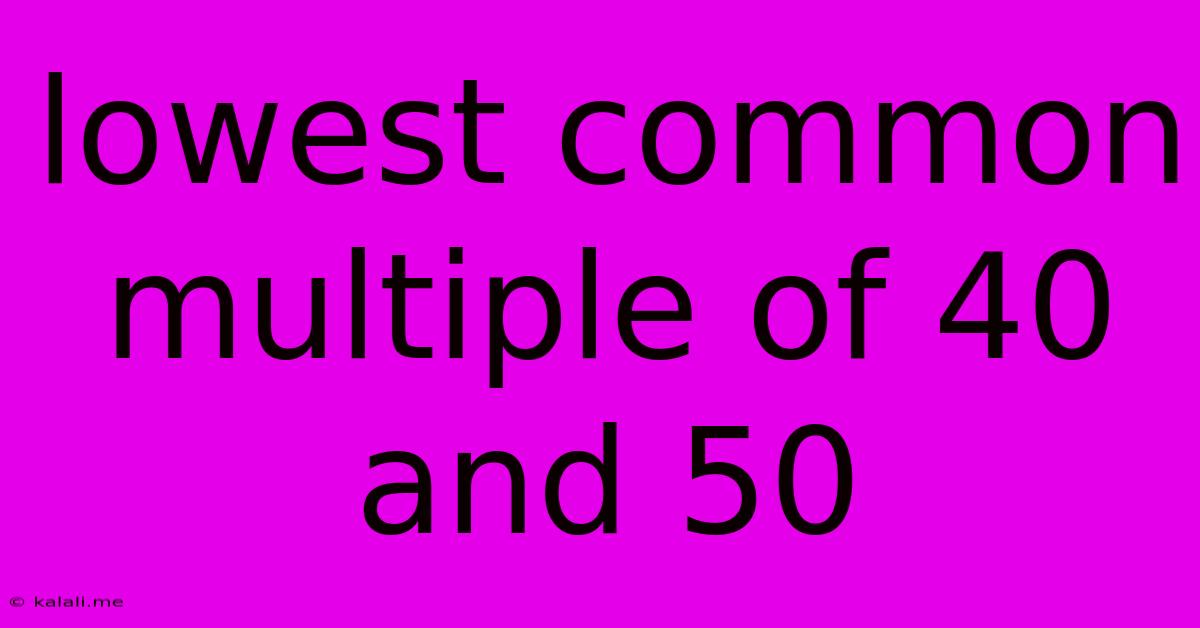Lowest Common Multiple Of 40 And 50
Kalali
Jun 13, 2025 · 2 min read

Table of Contents
Finding the Lowest Common Multiple (LCM) of 40 and 50: A Step-by-Step Guide
Finding the lowest common multiple (LCM) is a fundamental concept in mathematics, particularly useful in various areas like simplifying fractions and solving problems involving cycles or repetitions. This article will guide you through a simple and effective method to calculate the LCM of 40 and 50, and explain the underlying principles. We'll also explore alternative methods, making this a comprehensive guide for understanding LCM calculations.
What is the Lowest Common Multiple (LCM)?
The LCM of two or more numbers is the smallest positive integer that is divisible by all the numbers. In simpler terms, it's the smallest number that contains all the numbers as factors. Understanding LCM is crucial for working with fractions, simplifying expressions, and solving problems related to periodic events.
Method 1: Prime Factorization
This method is widely considered the most efficient and reliable way to calculate the LCM of larger numbers. Here's how to find the LCM of 40 and 50 using prime factorization:
-
Find the prime factorization of each number:
- 40 = 2 x 2 x 2 x 5 = 2³ x 5
- 50 = 2 x 5 x 5 = 2 x 5²
-
Identify the highest power of each prime factor present in either factorization:
- The prime factors are 2 and 5.
- The highest power of 2 is 2³ = 8
- The highest power of 5 is 5² = 25
-
Multiply the highest powers together:
- LCM(40, 50) = 2³ x 5² = 8 x 25 = 200
Therefore, the lowest common multiple of 40 and 50 is 200.
Method 2: Listing Multiples
This method is suitable for smaller numbers, but it can become cumbersome for larger numbers. It involves listing the multiples of each number until you find the smallest common multiple.
- List multiples of 40: 40, 80, 120, 160, 200, 240...
- List multiples of 50: 50, 100, 150, 200, 250...
The smallest multiple common to both lists is 200. Therefore, the LCM(40, 50) = 200.
Method 3: Using the Greatest Common Divisor (GCD)
The LCM and GCD (Greatest Common Divisor) of two numbers are related through the following formula:
LCM(a, b) x GCD(a, b) = a x b
-
Find the GCD of 40 and 50: The GCD of 40 and 50 is 10 (you can find this using prime factorization or the Euclidean algorithm).
-
Apply the formula:
- LCM(40, 50) = (40 x 50) / GCD(40, 50) = (2000) / 10 = 200
Again, the LCM(40, 50) is 200.
Conclusion:
We have demonstrated three different methods to calculate the LCM of 40 and 50, all yielding the same result: 200. The prime factorization method is generally preferred for its efficiency and applicability to larger numbers. Understanding LCM is essential for various mathematical applications, and mastering these methods will significantly enhance your problem-solving skills. Remember to choose the method that best suits the numbers you are working with.
Latest Posts
Latest Posts
-
With Respect To Advection Fog Which Statement Is True
Jun 13, 2025
-
The Gravitational Force Between Two Objects Is Proportional To
Jun 13, 2025
-
What Is The Closest Atmosphere Layer To Earth
Jun 13, 2025
-
Which Of The Following Sentence Is Correct
Jun 13, 2025
-
Oxidation Number Of Iron In Fe3o4
Jun 13, 2025
Related Post
Thank you for visiting our website which covers about Lowest Common Multiple Of 40 And 50 . We hope the information provided has been useful to you. Feel free to contact us if you have any questions or need further assistance. See you next time and don't miss to bookmark.